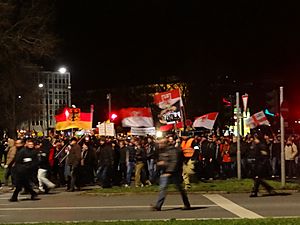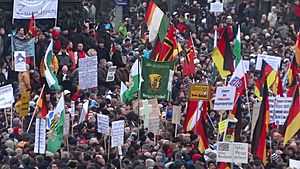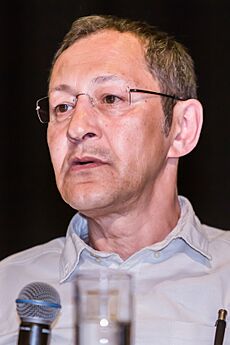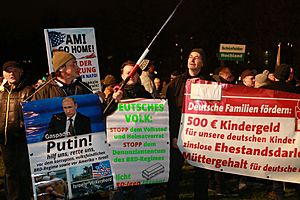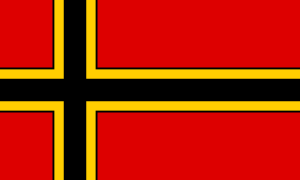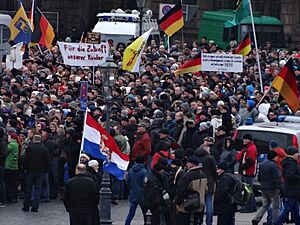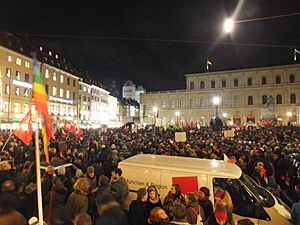Pegida facts for kids
|
Patriotische Europäer gegen die Islamisierung des Abendlandes
|
|
 |
|
| Abbreviation | Pegida |
|---|---|
| Formation | 11 October 2014 |
| Legal status | Eingetragener Verein (registered voluntary association) |
| Purpose |
|
| Location |
|
|
Official language
|
German |
|
Chair
|
Lutz Bachmann |
Patriotic Europeans Against the Islamisation of the West (German: Patriotische Europäer gegen die Islamisierung des Abendlandes), often called Pegida, is a group from Germany. They believe that Germany is becoming too influenced by Islam.
Pegida wants to limit people moving into Germany. They also say that the government is not doing enough to follow laws about immigration. The group started in October 2014 in Dresden with a few hundred people. In 2015 and 2016, their events grew to attract over 20,000 supporters. Often, other groups held protests against Pegida at the same time.
In 2015, Lutz Bachmann, who started Pegida, stepped down from his role. This happened after some controversial pictures and statements he made online became public. He was later allowed to return to his position.
Pegida's ideas have spread, and similar groups have started in other countries. It is part of a larger movement that opposes what it sees as the spread of Islam in Western countries.
Contents
History of Pegida
How Pegida Started
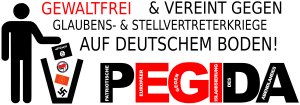
Pegida was founded in October 2014 by Lutz Bachmann. He runs a company that helps with public relations in Dresden. Bachmann decided to start Pegida after seeing a protest in Dresden. This protest was by people who supported the Kurdistan Workers' Party (PKK) against the Islamic State. He posted about it online and then created a Facebook group called 'Patriotic Europeans against Islamisation of the Occident'.
Before Pegida started, there were other events that Bachmann mentioned. For example, there were clashes between different groups in Celle. Also, in Cologne, some right-wing extremists caused trouble during a protest by "Hooligans Against Salafists." These events seemed to influence Bachmann's decision to start Pegida.
Early Demonstrations
The first protest, which Pegida called an "evening stroll," happened on October 20, 2014. Only a small number of people attended. But over the next few weeks, more and more people joined the weekly Monday demonstrations. By December 1, 2014, about 7,500 people were there. The police noted that some hooligans were among them. The number of participants grew to 10,000 by December 8, 2014.
During these weekly protests, Pegida supporters carried signs. These signs had messages like "For the preservation of our culture" and "Against religious fanaticism." They also called for peace and unity against religious conflicts in Germany.
In December 2014, Pegida became a legally registered group in Dresden. Bachmann became the chairman. The group also applied to be recognized as a nonprofit organization.
Events After the Charlie Hebdo Attack
Pegida cancelled its protest on December 29, 2014. However, in early January 2015, many people continued to join their events. After the tragic Charlie Hebdo shooting in Paris on January 7, 2015, some politicians warned Pegida. They said the group should not use this sad event to push their own political ideas. On January 10, 2015, about 35,000 people protested against Pegida in Dresden. They gathered to remember the victims in Paris.
On January 12, 2015, Pegida held a large rally with about 25,000 people. Bachmann announced Pegida's main goals. These included calls for careful immigration, removing religious extremists, and making sure people integrate into society. They also wanted stronger security within Germany.
A few days later, an immigrant was found dead in Dresden. Some international news reports talked about a feeling of anger and dislike in the area. They also showed comments from Pegida supporters that seemed to show disrespect for the dead person. Pegida leaders said they had no connection to the death. Later, police arrested and convicted one of the victim's housemates for the crime.
The police in Dresden did not allow a Pegida protest planned for January 19, 2015. This was because of a serious threat against one of Pegida's leaders. Pegida then cancelled its 13th protest. They said on Facebook that there was a clear threat against a leader from "ISIS terrorists."
Changes in Leadership
On January 21, 2015, Bachmann resigned from his role in Pegida. This happened after he faced criticism for some of his online posts. He had used very harsh words to describe immigrants in private messages. A picture of Bachmann that looked like a famous historical figure also spread widely. Later, a newspaper reported that this picture had been changed.
Other leaders also left Pegida. On January 28, Kathrin Oertel, a spokeswoman for Pegida, resigned. She said she faced many threats and problems in her career. Four other key figures also stepped down. On February 2, 2015, Oertel and six other former members started a new group. They wanted to be different from Pegida's more extreme ideas.
Bachmann Returns
In February 2015, Pegida announced that Lutz Bachmann was back as chairman. The other six members of the leadership committee re-elected him. This happened after a newspaper reported that the controversial picture of him had been altered.
Pegida's Political Steps
In June 2015, a woman named Tatjana Festerling ran for mayor of Dresden. She had support from a far-right party and received 9.6% of the votes. She was later removed from Pegida's leadership. On July 7, 2015, Bachmann announced that Pegida would take part in all future national elections in Germany.
More Protests and Stronger Views
When many people started arriving in Europe seeking safety in 2015, the Pegida movement grew again. About 20,000 supporters attended a rally in Dresden on October 19, 2015. At this time, some observers felt the group's views became even stronger.
On September 28, two journalists were hurt during a Pegida event. On October 12, some Pegida demonstrators carried signs that were seen as threatening towards political leaders. Bachmann called these signs "ridiculous."
At Pegida's anniversary event on October 19, 2015, a speaker named Akif Pirinçci gave a speech. He called Muslim refugees "invaders." He also said that politicians were acting against their own people. He claimed that politicians wanted critics of Germany's refugee policy to leave the country. The crowd cheered and laughed during his speech.
When 1,500 to 2,000 people celebrated Pegida's first anniversary in Leipzig, some hooligans caused damage to shops owned by foreigners. Over 100 people were arrested. The mayor called it "open street terror."
Starting a Political Party
Lutz Bachmann, the founder of Pegida, started a new political party. It is called the "Liberal Direct Democratic People's Party" (FDDV). This party was created on June 13, 2016. A person named Tommy Robinson also started a branch of Pegida in the United Kingdom.
Pegida's Ideas and Goals
In late 2014, Pegida shared a list of 19 ideas or goals. At first, their specific demands were not very clear. This was partly because Pegida did not want to talk to the press. They believed the media was biased. Demonstrators often chanted "lying press," a phrase with a long history in German politics.
Along with the German national flag, Pegida supporters often used a different flag. This flag was proposed in 1944 by a resistance member named Josef Wirmer.
According to a news report from December 2014, Pegida sees Islamism as an ideology that is unfair to women and promotes violence. In January 2015, The Guardian newspaper described Pegida as a far-right movement. The New York Times called Pegida "anti-immigrant." German Chancellor Angela Merkel has often questioned why Pegida sends its anti-immigrant messages.
A government agency in Thuringia believes that a local Pegida group is controlled by right-wing nationalists.
In February 2015, Pegida changed its 19 ideas into ten "Theses of Dresden." On September 10, 2015, Pegida asked for ten changes to Germany's refugee policy. They wanted to stop new asylum seekers immediately and create a special 'asylum-emergency law' for Germany.
Who Participates in Pegida?
| Date | participants per day |
|---|---|
| 20 October 2014 |
350
|
| 27 October 2014 |
500
|
| 3 November 2014 |
1,000
|
| 10 November 2014 |
1,700
|
| 17 November 2014 |
3,200
|
| 24 November 2014 |
5,500
|
| 1 December 2014 |
7,500
|
| 8 December 2014 |
10,000
|
| 15 December 2014 |
15,000
|
| 22 December 2014 |
17,500
|
| 5 January 2015 |
18,000
|
| 12 January 2015 |
25,000
|
| 25 January 2015 |
17,300
|
| 9 February 2015 |
2,000
|
| 16 February 2015 |
4,300
|
| 23 February 2015 |
4,800
|
| 2 March 2015 |
6,200
|
| 9 March 2015 |
6,500
|
| 16 March 2015 |
7,700
|
| 23 March 2014 |
5,500
|
| 30 March 2015 |
2,900
|
| 6 April 2015 |
7,100
|
| 13 April 2015 |
10,000
|
| 11 May 2015 |
3,000
|
| 18 May 2015 |
3,000
|
| 25 May 2015 |
2,200
|
| 1 June 2015 |
2,000
|
Experts say that Pegida is a mix of different people. This includes well-known figures from a far-right party, soccer hooligans, and also many regular citizens. One expert noted that the movement is strongest in areas where people have little experience with foreigners.
In December 2014, the head of Saxony's State Authority for the Protection of the Constitution said that Pegida was not under official watch. He stated there was no sign that the organizers were supporting extreme right-wing views. However, other reports disagreed, pointing to connections between a Pegida organizer and other anti-Islam groups.
A study by Dresden University of Technology interviewed 400 Pegida demonstrators. The main reasons people joined were unhappiness with the political situation (54%), concerns about "Islam, Islamism and Islamisation" (23%), criticism of the media (20%), and worries about asylum seekers (15%). The study suggested that Pegida was not just a group of extremists or unemployed people. Instead, it was a way for people to express feelings that had not been shared publicly before.
Another study found that Pegida was mostly made up of men. Participants were often employed and had a good education. They did not trust government institutions and supported a political party called AfD. This study concluded that Pegida supporters often showed dislike and racism towards certain groups.
By January 2016, the Pegida Facebook page had about 200,000 followers. This allowed users to share their ideas more easily, especially those not covered by mainstream news.
Some right-wing groups encouraged people to join Pegida rallies. Police also reported that a few hundred "violent hooligans" had been at the Dresden rallies since December 2014.
Reactions to Pegida
Protests Against Pegida
Many protests against Pegida have taken place across Germany. In January 2015, these counter-protests drew up to 35,000 people in Dresden and up to 100,000 nationwide. These numbers were much larger than Pegida's own protests at the same time.
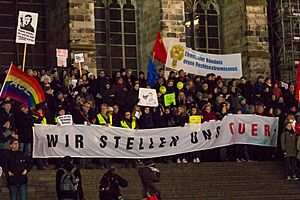
To protest a Pegida march, the lights of the Catholic Cologne Cathedral were turned off on January 5, 2015. The Volkswagen car plant in Dresden also used this method of protest.
A German newspaper called Bild started a petition against Pegida. Many famous people, including former leaders and athletes, signed it.
Public Opinion Surveys
Surveys showed different views on Pegida. In December 2014, one survey found that about half of Germans understood why Pegida protests were happening. This understanding was higher among supporters of certain political parties. Another survey found that 43% of Germans thought Pegida protesters were mainly worried about the "spread of Islam." However, 33% believed that mostly right-wing extremists attended the protests.
A survey in December 2014 found that 65% of Germans felt the government was not handling their concerns about immigration well. Also, 34% believed that Islam was increasingly influencing Germany.
Most Germans (85%) said they would not join Pegida protests. Only 9% were willing to demonstrate. Another survey showed that 67% of Germans thought the idea of "Islamisation" was exaggerated. But 29% felt there was too much Islamic influence and thought the protests were fair.
A report from November 2014 found that many Germans saw Islam as a danger. This suggested a "strong sympathy" for Pegida's ideas. For example, 57% of people surveyed thought Islam was a danger. Also, 40% felt like "foreigners in their own country." These opinions were found across different political groups and social classes.
Views from Political Leaders
Former Chancellor Angela Merkel criticized Pegida. She said that Pegida's leaders had "prejudice, coldness, even hatred in their hearts." The German Interior Minister, Thomas de Maizière, said that many ordinary people joined the rallies to express their worries about society. Bernd Lucke, a political party leader, said he thought most of Pegida's ideas were reasonable. He felt that the protesters believed politicians were not listening to their concerns.
Josef Schuster, who leads the Central Council of Jews in Germany, spoke against Pegida. He said that the idea of Islam taking over Germany was "absurd." Schuster called Pegida "highly dangerous." He mentioned attacks on places planned for refugees. He said Pegida was a mix of "neo-Nazis, far-right parties and citizens who think they are finally allowed to show their racism and xenophobia openly." He believed that fear of extremist groups was being used to unfairly criticize an entire religion.
A Muslim leader in Germany, Aiman Mazyek, said that right-wing extremists were giving a false idea of Germany as a racist country. He felt that the protesters' slogans showed that dislike of foreigners and anti-Jewish racism were becoming more accepted in society.
On January 5, 2015, the lights of the Brandenburg Gate in Berlin were turned off to protest a Pegida offshoot. The lights of the Kölner Dom in Cologne and the Semperoper in Dresden were also kept dark during Pegida marches. Protests against Pegida in Berlin and Cologne successfully stopped their rallies.
In January 2015, the U.S. Overseas Security Advisory Council warned U.S. citizens about Pegida and counter-Pegida demonstrations in German cities. They advised people to avoid these protest areas.
Views from Experts
Political scientists have different views on Pegida. Some believe that politicians are not sure how to deal with Pegida. They say it shows a serious problem in society that mainstream political parties are not addressing. This allows new groups critical of Islam and immigrants to form.
Other experts describe Pegida as a "middle-class right-wing populist movement." They say that Pegida's demands are similar to those of mainstream conservative parties. However, some researchers also point out that Pegida includes people with extreme right-wing views.
One expert noted that Pegida says what many people are thinking. He believes these opinions are common in society and that a strong anti-democratic potential is emerging. Another political scientist sees a link between Pegida and the increase in attacks on asylum seekers. He thinks that because politicians did not respond to people's fears about rising numbers of asylum seekers, these groups could use and increase those fears.
Some historians and political scientists have said that Pegida's ideas are not new in Dresden's history. They point to a long history of fear of foreigners in the city.
A political philosopher believes Pegida is an "anti-political" movement. He says that true political action helps everyone, especially minorities. He feels that Pegida is against different viewpoints and lacks understanding for others.
A researcher on prejudice, Wolfgang Benz, was surprised by how many people attended Pegida protests. He had warned that right-wing extremists would use fears of foreign influence for their own goals.
Another expert, Armin Pfahl-Traughber, calls Pegida protests "a new phenomenon of xenophobia." He accused Pegida leaders of encouraging "hostility and hatred against people of different backgrounds or religions."
In January 2015, the Council on Migration called for a new approach in German society. They suggested creating a committee to help redefine German identity in a diverse society. They also thought that German schools should teach about the importance of migration in Germany's history. The council believed that German policy had for too long ignored that Germany is a country of immigration. They suggested that integration efforts should not only focus on immigrants but also offer courses for groups like Pegida.
A political theorist, Wolfgang Jäger, sees Pegida as part of a growing trend of right-wing populism in Europe. He believes their anti-Islam views might be similar to older anti-Jewish ideas. He argues that Pegida's protests show their true goals are against the constitution, even if their official statements seem moderate. He also worried about old German nationalist ideas returning. He stressed that a democracy must protect its minorities and that learning about other cultures is important.
International Reactions
News organizations around the world also reported on Pegida. In France, newspapers discussed how Pegida showed divisions in German society. Some wondered if there were similarities to France's far-right National Front party. French cartoonists even published a flyer against Pegida. They said Pegida used the sadness after the Charlie Hebdo shooting for its own agenda. They stated that Pegida stood for everything Charlie Hebdo had fought against.
The Times newspaper said that for the first time since 1945, a German popular movement was openly complaining about an ethnic minority. This worried the government. BBC News noted that Germany was not used to such large protests supporting these kinds of views. The Guardian described Pegida as a growing movement against immigrants that could harm tourism.
The New York Times claimed that East Germany, due to its history, was more against foreigners than the rest of the country. The paper found it strange that there was fear of Islamisation in Saxony, where very few Muslims lived.
News channels in Turkey also reported on Pegida. One newspaper said the protests showed a "rise of the radical right in Europe." The Turkish prime minister compared Pegida followers to members of a terror group, saying both had old-fashioned ideas. He called the movement a "threat to Turks, Muslims and Germany itself."
The Arabic news network Al Jazeera mainly reported on the protests against Pegida.
Other Pegida Groups
In Germany
Pegida has led to many smaller groups forming across Germany. These include Legida in Leipzig, Sügida in southern Thuringia, and others in cities like Kassel, Würzburg, Bonn, Düsseldorf, and Frankfurt. Some of these groups had problems among themselves. For example, a Pegida group in North Rhine-Westphalia separated from others. They said the other groups had been taken over by members of a very anti-foreigner party.
Another group, Nügida, came under scrutiny. Some of its members were involved in a plan to bomb a refugee center.
Around the World
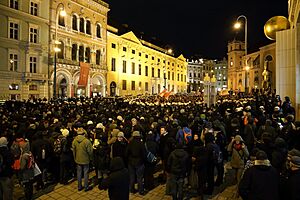
In January 2015, Pegida supporters held their first protest in Oslo, Norway. About 200 people attended, but support quickly dropped. In nearby Denmark, about 200 protesters marched in Copenhagen. A Spanish group tried to protest outside the main mosque in Madrid, but officials did not allow it. Protests were planned in Switzerland and Antwerp, Belgium, but were not allowed due to anti-terrorism actions. The Antwerp protest eventually happened without permission, and many people were fined.
On February 28, 2015, Pegida UK held its first protest in Newcastle upon Tyne, with about 400 people. Around 1,000 people protested against them. A smaller Pegida protest happened in London on April 4, 2015, with anti-fascist groups protesting against it.
The first Pegida protest in Sweden had only eight people in Malmö, while 5,000 people protested against them. Other attempts by Pegida in Sweden also gathered very few people. The Swedish branch later broke up.
A Pegida protest in Montreal, Canada, was cancelled when hundreds of people gathered to protest against it. In Toronto, a Pegida Canada protest in September 2015 had about a dozen members. It ended in a fight with counter-protesters, who greatly outnumbered the Pegida members.
An expert named Farid Hafez says that Pegida could not become strong in Austria. This is because a far-right party there already represented Pegida's ideas and attracted most of the people who would support such a group.
Pegida Ireland planned its first rally in Dublin on February 6, 2016. However, the event did not happen. Some Pegida supporters were attacked and chased into a store by a group from a counter-demonstration.
Fortress Europe Alliance
On January 23, 2016, representatives from 14 groups similar to Pegida met in the Czech Republic. These included Pegida Austria, Pegida Bulgaria, and Pegida Netherlands. Lutz Bachmann and Tatjana Festerling from Pegida Germany were also there. They signed the Prague Declaration. This document states their belief that "the history of Western civilisation could soon come to an end through Islam conquering Europe." This meeting officially made them part of the "Fortress Europe" alliance.
Other groups that signed included Czech organizations, the Polish National Movement, a party from Estonia, and a party from Italy. One participant said the meeting was a response to attacks on women in Cologne, Germany, on New Year's Eve 2016. The declaration ended by saying there would be protests on February 6, 2016, to show their determination. Other groups that joined this alliance or took part in Pegida protests include Identity Ireland, Pegida Switzerland, Pegida UK, and others from France and Australia.
|
See also
 In Spanish: Patriotas Europeos contra la Islamización de Occidente para niños
In Spanish: Patriotas Europeos contra la Islamización de Occidente para niños
 | Roy Wilkins |
 | John Lewis |
 | Linda Carol Brown |


